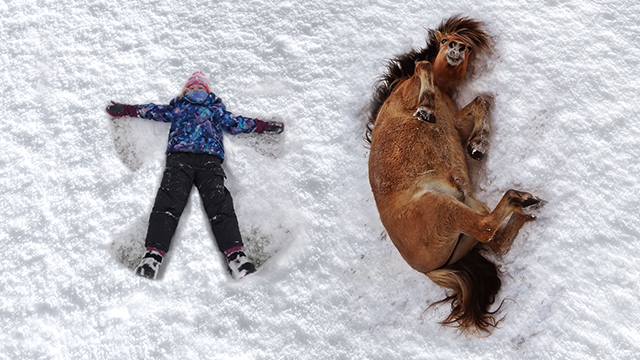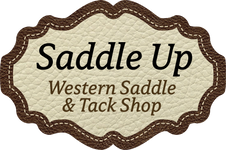Baby, It's Cold Outside - Let's Discuss The Best Colic Preventions
Posted by Lynnsy Johnson - Saddle Up on Nov 21st 2019
Hey cowboys and cowgirls! It is that time of year and here in Colorado, winter is hitting us hard already. Did you know that weather change is one of the number one culprits to causing colic? When that temperature drops, you have to be super cautious with your four legged friends. Regardless of weather, horses can colic so easily and extremely fast. Here are a few tips/tricks to help prevent colic and keep your ponies safe!
Always have fresh/clean water
Research shows that a horse being without water for 1-2 hours increased their risk for colic. In horses 6 years or older, that risk is 6 times more likely to happen. Always make sure your horse has enough water and that they are able to reach the water to get a drink. Another thing to watch for is that the water is thawed and not frozen. This important even if you use tank heaters. I know I have gone out to do chores and one of the heaters shorted out and the water was starting to freeze. Always, always, always check water. It is better to be safe than risk your horse getting sick.
Allow turnout room
Having a spot for your horse to roam allows them to not feel cooped up. They can go and get some exercise and even graze. A lot of times, hay quality can be iffy in the winter time, so having a pasture or grass area would be helpful so they can get the correct nutrients. One thing to be cautious of is making sure your horse doesn't eat too much green, rich grass. This can cause their stomachs to get upset and then it can turn into colic. It is good to let them out and let them move around, but if they eat too much then it can cause a bigger problem.
Avoid feeding hay on the ground, especially in sandy areas
It is always better to put hay in some type of bucket or feeder so that your horse isn't ingesting sand. If you horse gets a gut full of sand, then you have a sand colic on your hands. Just always to try to keep their food off the ground. Obviously, they are horses, so they may through small amounts out, but in general try feeding them in a feeder. If you do run into sand colic or you live in a sandy location, Sand Clear is a great product that you add into your horse's grain that helps reduce the risk of sand colic.
Be cautious with feeding grain and/or pelleted feeds
Grain and pelleted feeds can increase the risk of colic. A horse's natural diet consists of grass, so when you add in grain it can cause irritation. Pelleted feed led to a 6-9.5 times colic increase. Sweet feed led to a 4-7.5 times colic increase. Just be very cautious of giving to much grain or randomly adding grain to your horse's diet. If you do want to add grain, just do it gradually.
Avoid sudden change or stressful situations
Stress is a HUGE contributor to colic. Horse's can colic at the drop of hat so random change can really take a toll on them. Avoid strenuous exercise, change in stabling, or diet change. Colic risk increases within 2 weeks of change in your horse's routine. A daily routine can help keep them on the right track and less stressed. Hauling to different places or even switching hay can cause your horse to colic. We all know no matter what, life is stressful, but just try and introduce changes slowly and try keeping a normal routine for your horse.
Float their teeth every 6-12 months
Keeping up on a horse's dental work can really help them. This ensures that their food is chewed properly and it also eliminates sharp points in their mouth. These sharp points can cause sores, which then leads to them not wanting to eat, and then the risk of colic increases.
Keep up with worming
Keeping up on a deworming schedule is a great thing to do. This protects them against parasites, worms, and other yucky stuff that can bring them down. You can consult with your vet to see what wormer is best for each season.
Monitor what they eat and if they have behavior changes
Keep an eye out for toxic plants or other things in your horse's pen to ensure they do not eat it. If you notice any random behavior changes, just watch them and make sure it isn't anything dangerous.
Watch horse's who are pregnant, older, and more prone to colic/have multiple times
Take extra precautions for horses who fall into this category. If you have a pregnant broodmare, a senior horse, or a horse that just tends to colic often, keep a close eye on them when the temperature drops and make sure they have all the things they need to stay healthy.
Monitor horses who are being treated with bute
If horses are being treated with bute for any reason, it can make them more prone to colic. What's more dangerous is bute masks the symptoms of colic. If they need bute, it's ok, just be sure to discuss the dosage with your vet and long term plans.
Prepare for weather changes
When the weather starts getting cold or even really hot, it is just best to keep an eye on your herd and make sure to have things on hand to keep them from colicing. When the weather changes drastically, it takes a toll on your horse's body. Make sure they have a shelter, food, blankets if needed, and constant access to water. It also wouldn't hurt to keep banamine on hand and never be afraid to contact your vet.
We hope these tips on colic prevention help you out and that your horses stay happy and healthy! We wish you all a warm and joyful winter!

(picture credit: http://blog.cshorseproperties.com/prepare-horse-farm-winter-months/)
